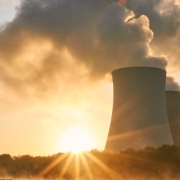Natural Gas and Chaos theory – predicting unpredictability
Remember in the movie Jurassic Park how the character played by Jeff Goldblum said the chaos theory explained why the dinosaurs were running amok? It was the park’s staff’s grossly incompetent planning.
In any event, as Jeff’s character tried to explain, scientific chaos is not the same as ordinary chaos. It simply means that it is impossible to predict exactly what will happen in all but the very simplest systems, even if every detail of its past and current conditions is known. This is because the slightest variation from the predicted path will quickly spin things off onto a surprisingly different course.
Astronomers can tell the basic size and shape of Jupiter’s orbit in a million years, but they cannot tell you where the planet will be in that orbit, because the gravitational interactions of multiple bodies are chaotic and inherently unpredictable. Meteorologists can tell you it will snow this winter in Sweden, but not how much and when because the littlest breeze could turn into a storm, but probably will not. If the first few proto-vertebrates had not survived, you would not be reading this. That’s chaos.
The Natural Gas business (in fact this is true for any business) is exposed to this very same chaos. I am not talking about the daily chaos on your desk. I am talking about the utter unpredictability of the market and all forces relating to it. We rely on all kinds of studies, predictions, and forecasts for our livelihood. Those producing them may know the very latest development of the whole energy world and they may have mind-bending numbers-crunching capability. Still, they cannot predict what will happen the very next minute. Are they all crap then?
Knowing that chaos reigns in our world is no excuse for not being prepared. Astronomers might not be able to predict the exact position of a planet. But they are very able to predict a path and as a result, can direct space probes. They then fine-tune when they come closer. They take their forecast as a best guess and build in enough fuzzy logic to make the model work in reality.
This fuzzy logic needs more nurture in the Natural gas world. We still think too much in absolutes when absolute certainties have died with the fall of the Iron Curtain. The real natural gas world is an inherently chaotic place.
The old Chinese said that it is impossible to predict the direction of the wind, but you can become better at setting sails. Instead of feasting on absolute certainties, we must become better sailsetters to steer your company’s ship clear of any danger the winds of trade might bring.
Judging from the last couple of years the record for the gas world has not been stellar. LNG export projects still built their projections upon exports into the US when it was long clear that shale had blown the lid. European utilities were still extending purchase agreements on oil-linked formulas when it must have been clear that those beasts were as dead as a Martian rock.
Why this inertia in the face of the obvious?
Part of it is plain old investment theory. It’s the same mechanics that push a small entrepreneur to put up the family silver to save the family enterprise when it is painfully clear that the company cannot be saved anymore. Maybe because the market had fundamentally shifted, it is bad management, and the company is beyond the cliff. It’s throwing good money after bad. But one likes to cling to some notion of hope that something will somehow save the day if one just sticks with what one had always done.
Or let’s take for example a spouse sticking it up with an abusive partner. Common sense would dictate to take a hike from the relationship but they often stick it up thinking that “the significant other” would change as one has invested time and effort to make this a success.
But this is the easy bit. What’s worse is that we plan too rigidly. Energy is a long-term business. You often have to take a strategic stance to position yourself for the future. That’s what BG did when they signed the EGLNG agreement which at the time (context matters) was outrageous for a buyer to sign. Everyone banked on the stellar rise of the US as a high-price LNG import market. Pegging to Henry Hub was considered foolish. But it turned out different. Was it wise planning from BG? We will probably never know but if I had to guess they banked on a rising US market.
As we all quite well know, this is not what came to pass and so BG had adapted to the changed circumstances. They had taken a shot and then kept refining their judgment as they came closer to realization. And they still keep doing that.
It’s a supreme reaction to what happens around you. Sometimes you are struck by the unforeseeable and then you have to place your correcting shot. One has to give in to chaos without allowing it to dominate you.
Those who know me will not be surprised that I am no big fan of big Master Plans. Not because it’s dumb to plan – it is very wise to plan ahead but if the plan becomes set in stone and does not bend over to whatever flips and twists reality has stored up for you, it’s your warrant of death.
Natural Gas has to loosen up a little to thrive again. And that means changing some really important things. Because chaos won’t care if you can deal with it or not. It will strike you where it hurts.


















Leave a Reply
Want to join the discussion?Feel free to contribute!